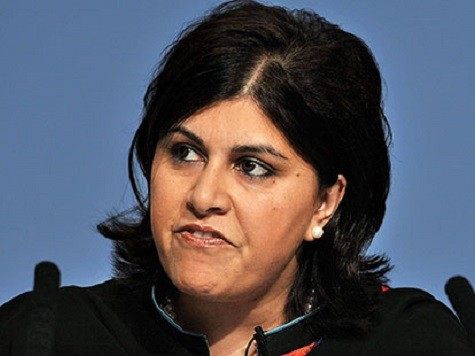Baroness Warsi has accused the government of failing to do enough to ‘engage’ with Muslim groups in Britain, and has even blamed the government for the failure by the Muslim Council of Britain to react positively to a letter from Communities Secretary Eric Pickles asking Imams to do more to tackle extremism and promote a positive image of Islam.
Following the Paris attacks in early January in which 17 people were murdered by Islamic gunmen, Pickles wrote to the Imams and leaders of Britain’s 1,100 mosques, urging them to play a positive role in combating Islamic extremism, which he called the “hijacking of a great faith”. “British values are Muslim values,” he wrote.
But the Muslim Council of Great Britain, which claims to speak for British Muslims, reacted angrily to the letter, accusing Pickles and his colleague Lord Ahmed, who co-wrote the letter, of behaving like “members of the far right.” Prime Minister David Cameron later said that “anyone, frankly, reading this letter, who has a problem with it, I think really has a problem. I think it is the most reasonable, sensible, moderate letter that Eric could possibly have written.”
Now Lady Warsi, who quit the Cabinet last August saying “I can no longer support this government’s policy on Gaza”, has voiced her opinion on the furore over the letter.
Writing in today’s Observer, Lady Warsi said “The letter contains some profoundly positive and inclusive sentiments… Having worked with Eric for over a decade, I know he wants to reach out and help create better communities.
“The problem was the letter’s timing, and that when government stretched out its hand in friendship there was no response from the other side.”
For Warsi, the lack of response from the other side is entirely thanks to the British government’s policy of ‘marginalising’ and ignoring potentially extremist groups instead of cultivating relationships with them, as Lady Warsi would like to have done.
Commenting on the Muslim Council of Great Britain, Lady Warsi says that “unlike some colleagues, I never viewed it as extreme or dangerous”, but concedes that it continues to produce a leadership that is neither equipped to represent, nor is genuinely reflective of, the contemporary aspirations of large sections of British Muslim communities.”
Nonetheless, she blames the mistrust and anger of imams affiliated with the Muslim Council on the government, for expecting a warm welcome when they have marginalised the Council over the years.
“In January 2011, I warned that anti-Muslim sentiment had “passed the dinner-table test” and become socially acceptable,” she writes. “Since then we’ve seen rising levels of anti-Muslim hate crime and increasingly vitriolic Islamophobic language. Yet not a single major government speech has reflected the concerns, worries and, yes, fear within the British Muslim community.
“So it’s no surprise there is a trust deficit, a questioning of motive to a letter sent with the best of intentions. For too many, the hand of friendship felt like an admonitory finger that was once again pointing at Britain’s Muslims.”

COMMENTS
Please let us know if you're having issues with commenting.